Doing Good with Data
Posted on November 13, 2015.
By Kaitlin Marshall

Credit: Malaria No More
Two months have passed since the United Nations ratified the Sustainable Development Goals (SDGs) which aim to eradicate poverty by 2030. The goals are lofty and include everything from equality of the sexes to ending hunger. Data that accurately reflects the progress being made towards achieving the SDG’s is going to be critical if each objective is to be met by the target date. As many as 350 million people in need, however, are virtually invisible to the international community because they are not represented by statistics. A third of the world’s births and two-thirds of the world’s deaths and their causes, for example, go unreported, and statistics about the number of people living in extreme poverty are out of date.
Technology and innovation are critical to enhancing data collection and analysis to the extent necessary to close the data gap. This is a time rich with opportunity to develop and harness new ways to use technology to capture and transfer data. From monitoring infectious diseases to supporting refugees along their journeys, a myriad of organizations are catching on to the power of data.
Continue Reading
Nonprofit with Land Rights Project in India Wins Humanitarian Award
Posted on November 5, 2015.
By India West Staff
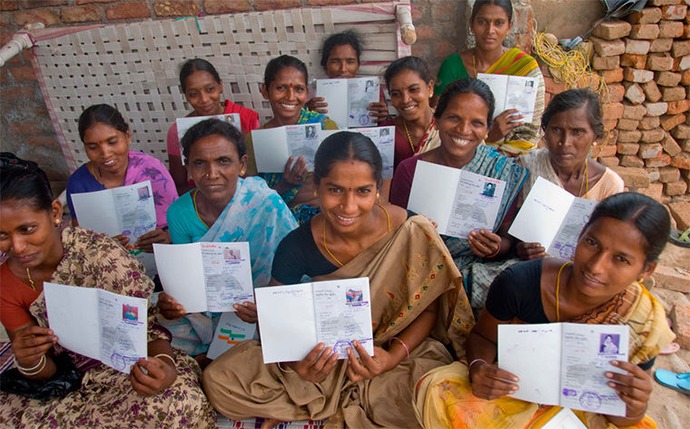
Seattle, Wash.-based nonprofit Landesa, an organization that strives to improve land rights in India and many other countries globally, was named the 2015 Hilton Humanitarian Prize winner by the Conrad N. Hilton Foundation. (Landesa.org photo)
A Seattle, Wash.-based rural development organization that has a branch focused on improving land rights in India was recently honored with the 2015 Hilton Humanitarian Prize by the Conrad N. Hilton Foundation.
The 20th annual award went to Landesa, which, as part of the award, will receive $2 million in unrestricted funding and join the Hilton Prize Coalition.
Read more at indiawest.com.
World Bank and Accenture Publish Report to Support Development of Identity Management Systems
Posted on October 28, 2015.
By Emma Schwartz of NetHope, a GlobalWA member
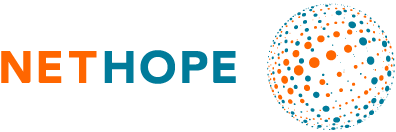 Today, over 1.8 billion adults in developing countries still lack proof of identity. Without official ID, this population is unable to access essential services such as healthcare and social welfare benefits and exercise fundamental human rights like the right to vote and the right to education.
Today, over 1.8 billion adults in developing countries still lack proof of identity. Without official ID, this population is unable to access essential services such as healthcare and social welfare benefits and exercise fundamental human rights like the right to vote and the right to education.
A new report from the World Bank and Accenture identifies a comprehensive strategy and implementation roadmap for developing nations seeking to build or expand citizen identity programs, regardless of a country’s level of technology infrastructure. The report, titled Identification for Development – Integration Approach (ID4D), shows that developing nations can reap the benefits of universal ID by gradually moving toward the use of standard requirements and by deploying interoperable technologies.
Read the full article at solutionscenter.nethope.org.
Global Partnerships on New Day Northwest
Posted on October 28, 2015.
October 2015 Newsletter
Posted on October 16, 2015.
Welcome to the October 2015 issue of the Global Washington newsletter.
IN THIS ISSUE
Letter from our Executive Director
Today is World Food Day, which serves as a good time to reflect on the conditions of hunger worldwide. While rising rates of obesity and diabetes plague the U.S., people in other parts of the world are dying from hunger-related causes. The issue of food security is more complex than simply sending our surplus overseas. But with our level of innovation and the ability to mobilize resources, we should be making progress towards reducing global hunger.
 And we are. According to the United Nations, the proportion of people who are undernourished in developing countries has fallen by almost half since 1990. Increasingly, people have more income to buy food and fuel local economies. Small-holder farmers are being recognized as central to the solutions. But there are still 795 million people worldwide who go to bed hungry.
And we are. According to the United Nations, the proportion of people who are undernourished in developing countries has fallen by almost half since 1990. Increasingly, people have more income to buy food and fuel local economies. Small-holder farmers are being recognized as central to the solutions. But there are still 795 million people worldwide who go to bed hungry.
Last month, the United Nations solidified the Sustainable Development Goals (SDGs) and Goal #2 is to end hunger by 2030. It will take a multitude of solutions to make this happen and several Global Washington members are working to achieve this target. There are also U.S. government programs such as Feed the Future and proposed reforms to food aid to support local procurement. I encourage you to read on to learn more.

Kristen Dailey
Executive Director
Back to Top
Congratulations to GlobalWA member Landesa, recipient of the 2015 Hilton Humanitarian Prize
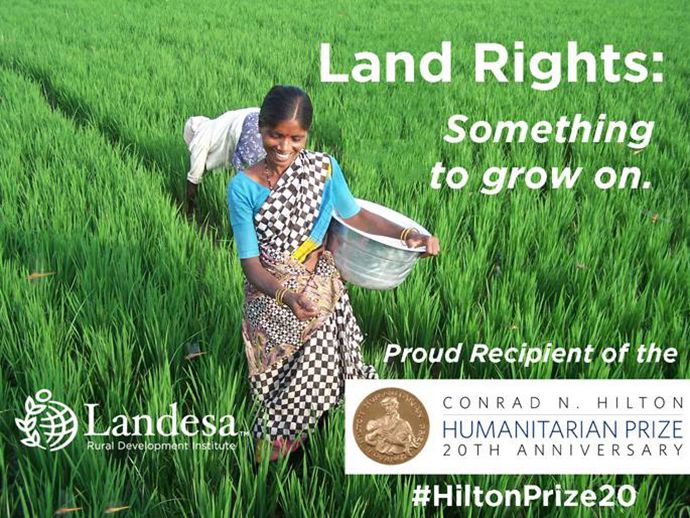
Read the press release.
Question of the Month
 Have you seen the agenda for our annual conference on December 10? What session and/or speaker are you most excited about?
Have you seen the agenda for our annual conference on December 10? What session and/or speaker are you most excited about?
Please click here to respond.
Back to Top
In the News
The Injustice of Food Insecurity
By Kaitlin Marshall
In 1996, the World Food Summit defined food security as existing “when all people at all times have access to sufficient, safe, nutritious food to maintain a healthy and active life.” Though the definition of food security is broad, the concept can be broken down into three specific pillars: availability, access and safety. A lack of sufficient quantities of food available on a consistent basis, an absence of resources to maintain a nutritious diet and unsanitary living conditions are all causes of food insecurity. Today, there are approximately 795 million people who are undernourished because of one or more of the aforementioned conditions. The global food and agricultural system must be reformed to nourish the world’s hungry.
The Challenge
From the 1960s to 1980s, the “Green Revolution” swept across Asia and Latin America. The immense effort to improve farming methods helped to double food production and saved hundreds of millions of lives. Following the Green Revolution many governments and donors, believing that the developing world now had an adequate food supply, turned away from the issue of food security. The approaches that were successful for farmers in Asia and Latin America, however, failed in Sub-Saharan Africa. Even certain places that did reap the benefits of the Green Revolution are now plagued by food insecurity because the new farming techniques were not sustainable long-term.
Population growth, rising cost of living, dwindling natural resources and climate change have put a strain on agricultural productivity, causing food prices to rise. Millions of families are at risk for poverty, malnutrition and hunger. In developing countries, 12.9 percent of the population is undernourished. Poor nutrition causes nearly half of the deaths of children under age five each year.
The majority of those affected by food insecurity are smallholder farmers. Most of these farmers struggle to get by as they combat drought, pests, unproductive soil and other obstacles. Even after a successful harvest, a lack of reliable markets and supportive government policy make profits elusive. Three-quarters of the world’s poorest people get their food and income by farming small plots of land. Improving the food and agriculture sectors of developing countries is essential to eliminating hunger and poverty.
Smallholder Farmers – The Key to Food Security
Agriculture is the single largest employer in the world, providing livelihoods for 40 percent of today’s global population. 500 million small farms worldwide provide up to 80 percent of food consumed in a large part of the developing world. When farmers grow more food and earn more income, the positive effects are immense. Secure farmers are better able to feed their families, send their children to school, and invest in their farms. This results in the farmer’s communities becoming more prosperous and stable. Helping farming families increase production in a sustainable way will be critical to reducing global hunger and poverty.
What Needs to be Done?
There is much work to be done if we hope to reach Sustainable Development Goal 2 of ending hunger and malnutrition by 2030. Global development professionals must listen and work with farmers to understand how to best address their specific needs. Increasing farm productivity will require a comprehensive approach that includes access to heartier seeds, more effective tools, improved farm management practices, locally relevant knowledge and reliable markets. As climate change and population growth continue to strain natural resources, the world must embrace sustainable practices that grow more with less cost. To keep up with the ever growing demand for food, the world is in need of innovative yet lasting solutions to end hunger. Several Global Washington members are working tirelessly to support farmers in the developing world, bolster food production and ensure that the world’s hungry achieve food security.
Global Washington Members Working in Food Security
Bill & Melinda Gates Foundation – The Bill & Melinda Gates Foundation is the largest private foundation in the world and is dedicated to improving the quality of life for individuals globally. Agricultural Development is one of the largest initiatives of the Foundation. The Foundation supports research to develop more nutritious varieties of stable crops grown by farming families, efforts to increase access to global markets, and more.
Grameen Foundation – The Grameen Foundation believes that all of us – even the poorest among us – can reach full potential if given access to the right tools and information. The Foundation works with governments and the private sector to empower farmers with relevant, timely and actionable information and financial services. Through the use of human networks and mobile technology, the Foundation is helping smallholder farmers improve their livelihoods.
Landesa – Landesa partners with governments and local organizations to secure legal land rights for the world’s poorest families. When families have secure rights to land, they can invest in their land to sustainably increase their harvests and reap the benefits — improved nutrition, health, education and dignity. Secure land rights are a critical, but often overlooked, factor in achieving household food security and improved nutritional status in rural areas of developing countries.
Lift Up Africa – Lift Up Africa supports programs that encourage self-reliance and provide solutions to disease, hunger, unemployment and lack of education. They strive to use local labor and materials whenever possible and concentrate on basic needs such as clean water, health care, adequate food supplies and dependable energy sources. Lift Up Africa aims to assist with projects that lead to independence and community ownership; to provide a hand up and not a hand out.
Literacy Bridge – Literacy Bridge is dedicated to empowering the world’s most underserved communities with life-changing knowledge to reduce poverty and disease. This is done through the Talking Book, an innovative low-cost audio computer that provides life-saving information in the form of actionable instructional messages. The ultimate goal of the agriculture messages is to increase crop yield through the adoption of best practices in farming. Farmers who had access to the Talking Book had an average increase in crop yield of 48 percent.
Marine Stewardship Council – Marine Stewardship Council aims to transform the world’s seafood market by promoting sustainable fishing practices. Half of the world’s seafood comes from developing countries, where millions rely on fish as a vital source of nutrition and income. The council’s vision is for the world’s oceans to be teeming with life, and seafood supplies safeguarded.
Mercy Corps – Mercy Corps believes, even in the world’s most challenging places, people have the power to transform their own lives when they have the right resources. The organization responds to food shortages by providing rations and working with local suppliers to speed delivery, save money and boost local economies. In addition to emergency responses, Mercy Corps is invested in building future food security. Mercy Corps helps farmers manage their land, increase their harvests, as well as helps connect them with new markets and technologies.
One Equal Heart Foundation – One Equal Heart Foundation supports the work of the Tseltal Maya in rural Chiapas, Mexico, as they build healthy and sustainable communities. In Chiapas, most families are food insecure with almost three-quarters of indigenous people suffering from malnutrition. It is the leading cause of death and illness in Chiapas and children are especially vulnerable. Foundation partners respond to the short-term needs of malnourished children by tracking their growth and development while they are treated with nutritional supplements.
Oxfam America – Oxfam America tackles the injustice of food insecurity and hunger by unlocking the potential of small-scale farmers – particularly women. Helping small-scale farmers be more productive can lift families out of poverty and end the cycle of food insecurity that threatens communities and nations. Oxfam’s agriculture and food security programs and advocacy promote locally sustainable solutions that meet the needs of small-scale producers, particularly women. Through focused and targeted advocacy, they also tackle the underlying policies and power imbalances that keep people in poverty.
PATH – PATH strives to deliver measurable results that disrupt the cycle of poor health. In contrast to many other health-related issues, malnutrition is completely preventable. That’s why PATH develops and promotes inexpensive and innovative health interventions aimed at making sure mothers-to-be, babies and children get the nutrients they need.
RESULTS – RESULTS is a movement of passionate, committed everyday people using their voices to influence political decisions that will bring an end to poverty. They work to effectively advise policy makers, guiding them towards decisions that improve access to health, education and economic opportunity. With every hour of their time, their impact is multiplied through advocacy – whether helping change policy to support millions of families putting food on the table or helping raise billions of dollars for the most vulnerable children.
The Borgen Project – The Borgen Project believes that leaders of the most powerful nation on earth should be doing more to address global poverty. They’re an innovative, national campaign that is working to make poverty a focus of U.S. foreign policy. By meeting with U.S. leaders to build support for life-saving legislation and effective poverty-reduction programs, they mobilize people across the globe behind efforts to make poverty a political priority, including food security.
U.S. Fund for UNICEF – UNICEF does whatever it takes to save and protect the world’s most vulnerable children. Recognizing that the health, hygiene, nutrition, education, protection and social development of children are all connected, they work to ensure that children not only survive, but thrive. UNICEF battles food insecurity by tackling childhood malnutrition, stabilizing high food prices and providing short and long term responses to community food crises.
Back to Top
In the News
What are the “Fundamentals of Food Security,” really?
By Jim French, Senior Advocacy Advisor for Agriculture, Oxfam America
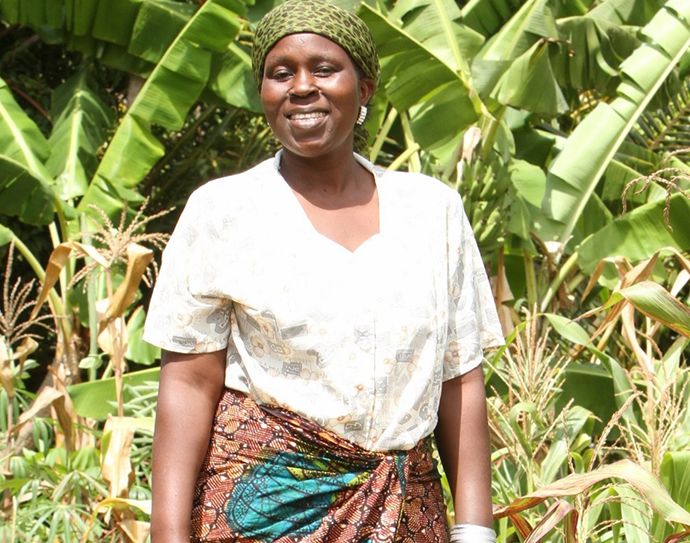
Bahati Muriga, 2014 Tanzanian Female Food Hero. Credit: Kwetu Studios for Oxfam
What are the necessary actions to create a just, sustainable, and resilient food system for everyone?
This Friday, October 16 is World Food Day – a day when people around the globe consider the essential role that bountiful, nutritious, and accessible food either does or doesn’t play in their lives. Unfortunately, for the majority of world’s population, having adequate, nutritious food is not a certainty.
Each year around the time of World Food Day, the World Food Prize is awarded to a person or persons who have made a significant contribution to improving the quality, quantity, or availability of food in the world. Plant breeder and 1970 Nobel Peace Prize winner, Norman Borlaug , established the award, and each year the ceremony is accompanied by a three day international symposium attracting almost 2,000 guests from around the globe to Des Moines, IA.
Since 2010, Oxfam has worked to make sure that the innovations, concerns, and voices of small-holder farmers are represented at the symposium. This year will be no exception as Tanzanian Female Food Hero, Bahati Muriga , arrives to speak in this Midwestern city thousands of miles away from the Horn of Africa and surrounded be fields of ripe corn and soybeans.
The theme of the 2015 symposium is Fundamentals of Food Security . I have been thinking about that theme and considering what “fundamentals” there are when it comes to creating food security. I suppose too many of the people attending the Prize conference it means good seeds, fertile soil, labor saving machinery, and good agronomic practices. Being a farmer in Kansas myself, I would acknowledge that these things are necessary.
But are there other parts of the food system just as fundamental to creating a world where everyone is well-fed?
Some questions come to mind: What do good seed, fertilizer and tools mean if climate change contributes to unpredictable weather, and poor harvests? What do the components of producing food mean if the market is rigged, and a farmer can’t meet her costs? What do the means of production mean if a farmer is never sure that her land will not be taken away in the next season?
These are the questions that the majority of the world’s farmers face each year – those small-holder farmers producing up to eighty percent of the food in in sub-Saharan Africa and Asia.[1] And it is in the rural areas of these regions where the greatest poverty is also concentrated.
Food production doesn’t exist in a vacuum. It is built on knowledge, markets, infrastructure, investments and policies. So building a food secure world means more than buying the right seed, fertilizer or tractor. It means concentrating action where there is the greatest number of farmers and where the greatest concentration of hunger exists.
So in this World Food Day season, and when bountiful crops of corn, soybeans, and sorghum are being harvested in Iowa and my state of Kansas, it is my hope that our focus on fundamentals will include these three steps for building a productive and sustainable global agriculture system:
STEP 1: Take action on climate change. And while we are doing that, countries like the US must honor its commitment to the Green Climate Fund set up to help poor countries prepare for climate change and cut their emissions. So far, 28 countries have pledged a total of $10.2 billion to get the Green Climate Fund up and running. On behalf of the United States, President Obama has pledged a total of $3 billion to help establish the Green Climate Fund , and has requested $500 million in his current budget. Congress now must follow-through on the first installment of this pledge.
STEP 2: Reform food aid. When disaster strikes and chronic hunger occurs in specific regions, food aid should be delivered in a way that does not disrupt the markets and livelihoods of farmers within the region. One of the most efficient and effective ways of fighting hunger is procure food from local and regional sources. In the US, the bulk of food aid comes from US commodities and half of the money spent on aid goes to shipping and overhead. We can do better, by passing legislation like the Food Aid Reform Bill of 2015.
STEP 3: Focus on small-holder farmers. Those that produce the majority of the world’s food each day but face the greatest challenges of poverty and hunger – should be empowered. And more importantly, a focus on women farmers should be a priority. For example, across Africa, eight out of ten people who work in farming women, says the World Food Program. [2] In Asia, six out of ten are women. The UN’s Food and Agriculture Organization estimated that if “women farmers had the same access to resources as men, the number of hungry in the world could be reduced by up to 150 million.” [3]
Right now, US policies that govern foreign agricultural development have prioritized gender and increased the focus on small-holder agriculture through Feed the Future administered through USAID. There is a unique opportunity to build on and make Feed the Future permanent by passing the Global Food Security Act of 2015 in both the US House and Senate.
Yes, food security needs seeds, soil, and technology. But without women farmers, like Tanzania’s Female Food Hero Bahati Muriga, feeding the world will be an almost impossible task. So on this World Food Day, don’t just thank a farmer. Take the actions necessary to create a just, sustainable, and resilient food system for everyone.
[1]http://www.fao.org/fileadmin/templates/nr/sustainability_pathways/docs/Factsheet_SMALLHOLDERS.pdf
[2]https://www.wfp.org/our-work/preventing-hunger/focus-women/overview
[3]Women in Agriculture: Closing the Gender Gap for Development, FAO, 2011
Back to Top
Featured Organization
Adara Development
By Kaitlin Marshall
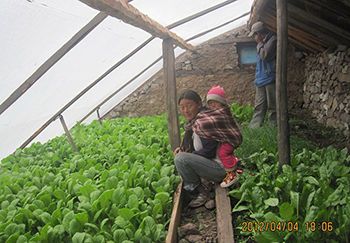 Adara Development partners with communities in remote areas of Nepal and Uganda to improve people’s lives through health and education. Adara has been in Nepal since 1998, working in the isolated district of Humla throughout that entire period. Nestled in the Himalayas in the northwestern part of the country, Humla is plagued by poverty and can only be reached by small aircraft or by hiking. “We’ve been working there since the very beginning,” said Debbie Lester, Adara’s Clinical Programs and U.S. Country Director. “We do a lot of basic health, sanitation and hygiene programs in Humla. It really started right at the bare basics.”
Adara Development partners with communities in remote areas of Nepal and Uganda to improve people’s lives through health and education. Adara has been in Nepal since 1998, working in the isolated district of Humla throughout that entire period. Nestled in the Himalayas in the northwestern part of the country, Humla is plagued by poverty and can only be reached by small aircraft or by hiking. “We’ve been working there since the very beginning,” said Debbie Lester, Adara’s Clinical Programs and U.S. Country Director. “We do a lot of basic health, sanitation and hygiene programs in Humla. It really started right at the bare basics.”
Forty percent of Nepali children have their growth stunted by malnutrition, and in Humla malnutrition is an even more serious problem. “As Humla is in such a remote and mountainous part of Nepal, malnutrition is a huge problem there. There is a 60% prevalence of stunting, and a 4.4% prevalence of severe acute malnutrition,” said Pralhad Dhakal, Adara’s Nepal Country Director. In the winter, temperatures frequently fall below zero and food shortages are common. To alleviate malnutrition in Humla, especially during the harsh winter months, Adara launched food security initiatives in 2004 firstly through providing families with nutritious porridge for the children.
In 2013, Adara focused on providing farmers with what they need to build and maintain a greenhouse. “What we do is a lot of different training on greenhouse construction and repair, and we supply the necessary materials to farmers,” explained Angjuk Lama, Adara’s Humla Program Manager. The greenhouses allow the farmers and their communities to supplement their diets with fresh vegetables during the winter when nutritious food is scarce. To date, Adara has assisted in the construction of 239 greenhouses and repair of about 49 that have been damaged by snow.
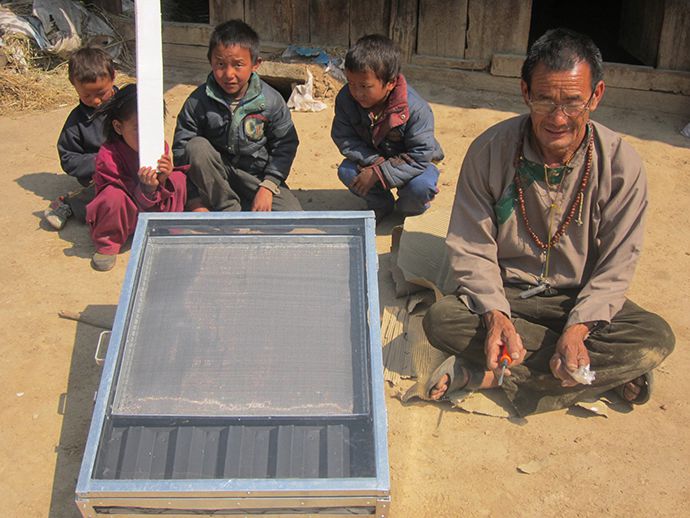 Adara works with farmers in each target village and provides them with the necessary materials and technical assistance to build a greenhouse, as well as the technical training. “We provide materials like the plastic sheets, garden pipes and watering cans, and then the seeds to grow in the greenhouse” said Lester. While Adara continuously improves the design of their greenhouse technologies to meet community needs, there are a number of materials that the farmers provide for themselves. “We always believe in partnering,” said Lester. “The farmers bring their labor and also core materials that are available to them. We insist that farmers construct the greenhouses themselves in partnership with Adara.”
Adara works with farmers in each target village and provides them with the necessary materials and technical assistance to build a greenhouse, as well as the technical training. “We provide materials like the plastic sheets, garden pipes and watering cans, and then the seeds to grow in the greenhouse” said Lester. While Adara continuously improves the design of their greenhouse technologies to meet community needs, there are a number of materials that the farmers provide for themselves. “We always believe in partnering,” said Lester. “The farmers bring their labor and also core materials that are available to them. We insist that farmers construct the greenhouses themselves in partnership with Adara.”
Educating the villagers to rely on themselves is a critical component of Adara’s model of collaboration. Every village is visited regularly by Adara’s agricultural assistant. “He trains the villagers on how to use, manage and repair the greenhouses and solar dryers to ensure that they are used properly,” said Lester. Since 2013, Adara employees have led eleven training sessions to educate the farmers of Humla.
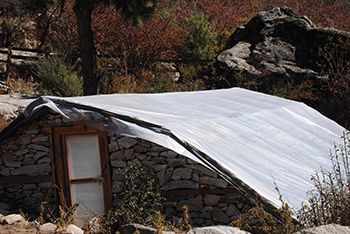 In addition to teaching the farmers how to construct and care for their greenhouses, Adara is supporting the Humli people with tree plantation and fruit orchard development. The organization also provides key technologies that allow the farmers to harvest the most from their greenhouses and orchards. Solar dryers, for example, allow farmers to “dry out their food for the cold winter months…it’s easier and more hygienic to dry vegetables and fruits without losing nutrients [this way].” Having nutrient-rich food to last through the winter has resulted in lower levels of malnutrition in children in the villages where Adara has a presence.
In addition to teaching the farmers how to construct and care for their greenhouses, Adara is supporting the Humli people with tree plantation and fruit orchard development. The organization also provides key technologies that allow the farmers to harvest the most from their greenhouses and orchards. Solar dryers, for example, allow farmers to “dry out their food for the cold winter months…it’s easier and more hygienic to dry vegetables and fruits without losing nutrients [this way].” Having nutrient-rich food to last through the winter has resulted in lower levels of malnutrition in children in the villages where Adara has a presence.
Adara will continue working with the Humli people to create systems that strengthen infrastructure and lead to sustainable lifestyle improvements. “There’s some new roads going in that are bridging access to Humla,” said Lester, “so that could change the food security issues going forward.” As roads are introduced, access to food increases. These foods, however, include such items as white rice “that aren’t as nutritiously dense as some that you may grow yourself.” Adara is committed to Humla for the foreseeable future, no matter what changes may come.
“The great thing about the areas we work in is having that really long-term investment and commitment, because when you are fast tracking through programs you often lose that relationship piece,” said Lester. For the Humli people, knowing that Adara is not going anywhere has led to a trusting relationship. “That goes a long way in terms of what you can achieve together.”
Back to Top
Changemaker
Christopher Shore, World Vision
By Kaitlin Marshall
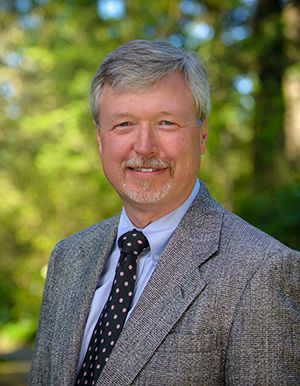 There are approximately 795 million people worldwide who are undernourished due to lack of a secure food supply. A lack of sufficient quantities of food available on a consistent basis, an absence of resources to maintain a nutritious diet, and unsanitary living conditions are all causes of food insecurity. World Vision partners with communities to address immediate food needs and to help people learn to grow a sustainable food supply. In 2014, the organization provided $263.9 million in food assistance to 8 million people in 35 countries. At the forefront of World Vision’s efforts is Christopher Shore, the organization’s Chief Development Officer of Economic Development, Resilience, and Livelihoods.
There are approximately 795 million people worldwide who are undernourished due to lack of a secure food supply. A lack of sufficient quantities of food available on a consistent basis, an absence of resources to maintain a nutritious diet, and unsanitary living conditions are all causes of food insecurity. World Vision partners with communities to address immediate food needs and to help people learn to grow a sustainable food supply. In 2014, the organization provided $263.9 million in food assistance to 8 million people in 35 countries. At the forefront of World Vision’s efforts is Christopher Shore, the organization’s Chief Development Officer of Economic Development, Resilience, and Livelihoods.
Shore, who holds degrees in finance and business, has spent the last 25 years working in microfinance and economic development. Since joining World Vision in 1997, he has prioritized transforming the economic status of food insecure populations. “One of the basic definitions of development is that people are food secure,” said Shore. Otherwise, “we don’t have development happening.”
Shore focuses his team’s work on building improved and resilient livelihoods for the world’s 500 million small-holder farmers. Despite depending on agriculture for their living, small-holder farmers are often the least food secure population. Degraded land, unpredictable markets, and erratic weather patterns caused by climate change threaten to hinder the crop production and profits of farmers on a daily basis. “Their economic returns are so low,” said Shore, “that they do not create a buffer to be able to deal with shocks. Any shock can decapitalize them, leaving them even more vulnerable, and more food insecure.”
A crucial component of creating sustainable farming practices is teaching farmers how to adapt to climate change. World Vision’s environmental projects include reforestation, soil quality improvement, and improving water irrigation. “The farming system has to, [for example], be able to cope with the ups and downs of rainfall,” said Shore. The farmers “have to have boosted their productivity enough so that the normal variations in prices aren’t going to wipe them out.”
In addition to preparing farmers to handle environmental changes, World Vision is equipping them to handle market fluctuations. By providing agriculture and business education and microfinance opportunities, Shore has developed a model to help smallholder farmers lift themselves out of poverty. One of World Vision’s tactics for teaching financial expertise is inviting smallholders to join savings groups. As the groups save, they lend the money to each other and charge interest. The savings groups build financial capital and human capital because the farmers learn financial literacy. “They learn how to save, they learn how to borrow, they learn how to do the lending, and they understand those financial processes,” said Shore. Through the savings groups, farmers earn more money and realize they can work together to improve their agricultural prowess. World Vision also assists smallholders through financial services and access to microfinance lending. Under Shore’s leadership World Vision has built one of the largest networks of microfinance institutions in the world, which is increasingly focused on agricultural lending.
All of Shore’s strategies, from the savings groups to microfinance lending, are helping World Vision reach one goal: “to move smallholder farmers completely out of poverty.” Farmers, according to Shore, are critical to the global issue of food security because their productivity has the potential to increase massively. “We can help them be more productive, more profitable, more resilient, all at the same time.”
Shore describes himself as an economic development guy who began understanding the issues of climate change and realized how much the environment affects smallholder farmers. By working with farmers on environmental and economic issues, he wants to provide smallholders with the greatest economic transformation of their lives. “This sounds absolutely audacious, but our goal really is to end poverty in those places we are working, said Shore. “We’re aiming to use market mechanisms to make that happen.”
Back to Top
Welcome New Members
Please welcome our newest Global Washington members. Take a moment to familiarize yourself with their work and consider opportunities for support and collaboration!
The Mifos Initiative
The Mifos Initiative aims to speed the elimination of poverty by coordinating a global community that builds, supports and uses Mifos X, a free and open source platform that enables financial service providers to more effectively and efficiently deliver responsible financial services to the world’s 2.5 billion poor and unbanked. www.mifos.org
Back to Top
Member Events
October 15-25: Tasveer Seattle // South Asian Film Festival
October 22: Shoreline Community College // How to Believe in Universal Human Rights Without Being a Moral Imperialist
October 24: NPH USA // Gala Dinner and Auction
October 24: Women’s Enterprises International // Harambee 2015 – 15th Annual Dinner and Celebration
October 25: Living Earth Institute // Annual Fundraiser Dinner
October 29: Global Partnerships // Annual Luncheon
October 29: Sahar // Annual Fundraising Dinner: A New Day, A New Voice
November 4: International Foster Care Alliance // Appetizers and Wine Fundraiser
November 7: Water1st International // 2015 Give Water Give Life Benefit
Back to Top
Career Center
Highlighted Positions
Software Developer, Lead, Mobile Health Innovations – Grameen Foundation
Application Development Manager – SightLife
Monitoring & Evaluation Manager – Splash
For more jobs and resources, visit https://globalwa.org/resources/careers-in-development/
Back to Top
GlobalWA Events
October 22: Networking Happy Hour
December 10: GlobalWA 7th Annual Conference
Back to Top
World Food Day 2015
Posted on October 14, 2015.
By Kaitlin Marshall
 October 16 marks World Food Day, a day to bring people together to demonstrate their commitment to eliminating hunger within our lifetime. World Food Day was first observed in 1979, and was established to celebrate the anniversary of the creation of the Food and Agriculture Organization of the United Nations (FAO). Various events and campaigns are hosted by governments and non-profits on World Food Day to engage people in action against hunger. In North America, for example, such happenings typically include food drives and packaging events. Around the globe, people participate in advocacy marches to encourage people to participate in the fight to end hunger and malnutrition.
October 16 marks World Food Day, a day to bring people together to demonstrate their commitment to eliminating hunger within our lifetime. World Food Day was first observed in 1979, and was established to celebrate the anniversary of the creation of the Food and Agriculture Organization of the United Nations (FAO). Various events and campaigns are hosted by governments and non-profits on World Food Day to engage people in action against hunger. In North America, for example, such happenings typically include food drives and packaging events. Around the globe, people participate in advocacy marches to encourage people to participate in the fight to end hunger and malnutrition.
Continue Reading
International Foster Care Alliance [IFCA] To Be Recognized as an Angel in Adoption™ at National Event in Washington, D.C.
Posted on October 7, 2015.
By Allison Coble, Senior Director of Programs, Congressional Coalition on Adoption Institute
Washington DC– October 6th, 2015– The Congressional Coalition on Adoption Institute (CCAI) will honor International Foster Care Alliance [IFCA] as an Angel in Adoption™ at an awards ceremony on October 6 and gala on October 7 in Washington, D.C.
International Foster Care Alliance [IFCA] is being honored for its excellent accomplishment in connecting foster youth and foster care alumni between the United States and Japan.
The Angels in Adoption™ Program is CCAI’s signature public awareness campaign and provides an opportunity for all members of the U.S. Congress to honor the good work of their constituents who have enriched the lives of foster children and orphans in the United States and abroad. This year, more than 150 “Angels” are being honored through the Angels in Adoption™ program.
Continue Reading
The Heart of the Congo: Where Even Coca-Cola Doesn’t Get To
Posted on October 1, 2015.
Wendy Prosser, Program Manager for GlobalWA member VillageReach
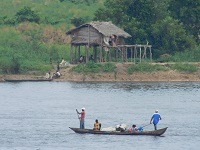 Many people in global health talk about how Coca-Cola supply chain practices could be applied and adapted to health commodities to ensure that vaccines, malaria treatment, family planning commodities, and many more essential medicines are available at the last mile health facilities. And they have a point—I have seen Coca-Cola in pretty much every village I’ve been to in Africa throughout my almost 20 years of going to these remote places.
Many people in global health talk about how Coca-Cola supply chain practices could be applied and adapted to health commodities to ensure that vaccines, malaria treatment, family planning commodities, and many more essential medicines are available at the last mile health facilities. And they have a point—I have seen Coca-Cola in pretty much every village I’ve been to in Africa throughout my almost 20 years of going to these remote places.
However, that cannot be said for the south part of the Equateur Province in the Democratic Republic of Congo.
Continue Reading
An Aid Worker Tells the Harrowing Story of one Syrian Family’s Escape to Greece
Posted on September 16, 2015.
By Jennifer Butte-Dahl, Applied International Studies Director at UW’s Jackson School, a Global Washington member

Reuters/Zohra Bensemra
In Lesbos, the sun is rising—illuminating a sea that hides tragedy below its surface. We are carrying family tents designed for humanitarian relief through the site, looking for empty spaces to set them up, when a man approaches our group and asks if we could use a hand. Two young boys stand at his side, eager to assist.
“I don’t want anything in return,” he says. “I just want to help.”
It’s another 90-degree Fahrenheit day under the Mediterranean sun on this small Greek island. Only six miles from the western shore of Turkey, Lesbos is the main gateway to Europe for thousands of families who arrive daily from Syria, Afghanistan, Iraq, and beyond. The Office of the United Nations High Commissioner for Refugees (UNHCR) estimates that over 258,000 migrants have arrived on the shores of Greece since the start of 2015. Almost half that number—122,400 as of Sep. 6—has come via Lesbos. For a small, picturesque Greek island with a local population of only 86,000 people, the influx of newcomers is overwhelming.
Click here to read the full article.
September 2015 Newsletter
Posted on September 15, 2015.
Welcome to the September 2015 issue of the Global Washington newsletter.
IN THIS ISSUE
Letter from our Executive Director
India is often called a country of paradoxes. The largest democracy in the world is home to 1.21 billion people, and can be incredibly chaotic and thriving at the same time. There are 22 Indians who rank in the top 500 richest people in the world alongside 300 million people who live in extreme poverty on $1.25 per day. India has some of the world’s most successful tech centers, yet is home to the world’s largest illiterate population of 287 million people. While great strides have been made to reduce poverty, India still faces complex challenges. A number of Global Washington members are working to improve conditions for the country’s poorest citizens.
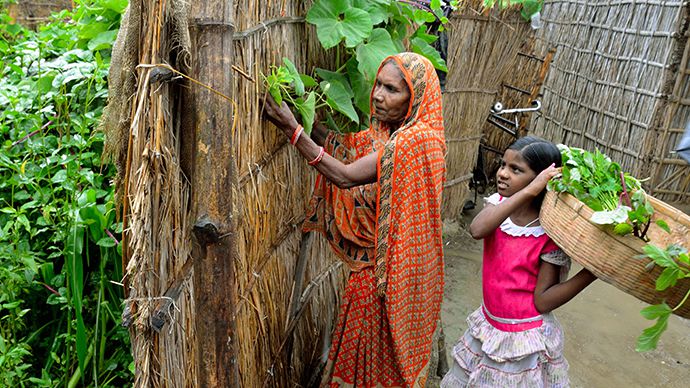
Landesa is assisting India’s 15 million landless families obtain ownership of small plots of land. And SightLife has partnered with health organizations in India to provide corneal transplants for the blind so that they may live full, productive lives. Other GlobalWA members such as Upaya Social Ventures, Unitus Seed Fund and Grameen are improving livelihoods through economic development.
To join the conversation around creating innovative solutions to global poverty in India and around the world, come to our 7th Annual Conference this December as we focus on Disruptive Development and feature a packed agenda of peer learning opportunities, provocative speakers and networking with 400 leaders in the international development field. Early bird registration ends September 30 — sign up today!

Kristen Dailey
Executive Director
Back to Top
Question of the Month
 GlobalWA will ask you a question every month and synthesize the responses and make available to our member organizations. Please take a moment to respond to the question for this month:
GlobalWA will ask you a question every month and synthesize the responses and make available to our member organizations. Please take a moment to respond to the question for this month:
1. Are you a leader of a nonprofit GlobalWA member organization and interested in telling your organization’s story at GlobalWA’s 7th Annual Conference on December 10?
2. The theme of this year’s conference is Disruptive Development. Does your organization have a “disruptive” approach to improving lives in developing countries?
Please click here to respond.
Back to Top
In the News
Washington State Organizations Play Leading Role in India
By Sydney Martinez
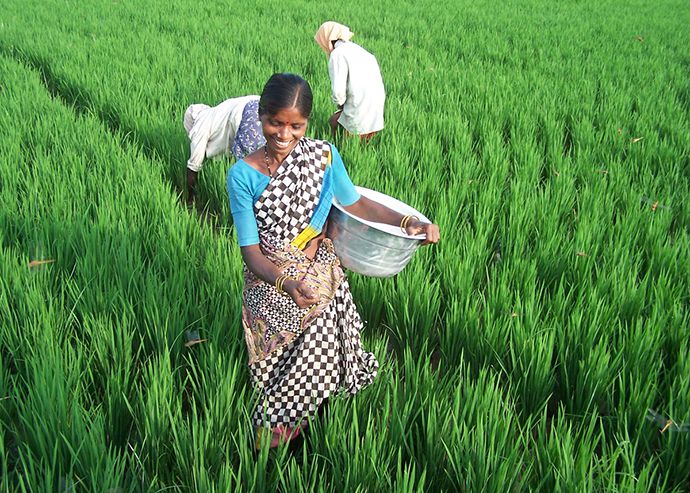 When India became independent in 1947, Jawaharlal Nehru, the country’s first Prime Minister, stressed the importance of ending poverty, ignorance, disease and inequality. In recent years, India has enjoyed consistently high rates of growth and steady improvement in human development. But a critical challenge remains for the world’s largest democracy. Despite growth and steady development, persistent poverty and inequality remain.
When India became independent in 1947, Jawaharlal Nehru, the country’s first Prime Minister, stressed the importance of ending poverty, ignorance, disease and inequality. In recent years, India has enjoyed consistently high rates of growth and steady improvement in human development. But a critical challenge remains for the world’s largest democracy. Despite growth and steady development, persistent poverty and inequality remain.
Millennium Development Goal (MDG) reporting reveals that India is on track to achieve target goals on poverty reduction, education and HIV at aggregate levels. However, much work remains to be done to reduce hunger, improve maternal mortality rates and enable greater access to clean water and sanitation. India must reduce social and geographic inequalities to make these goals achievable. As rising gender inequality continues to hamper progress, women are regularly excluded from social, economic and political domains. With 1.21 billion people, India’s lack of progress drastically impacts the overall success of the MDGs.
India’s relationship with NGOs
The Indian government has been applauded for their collaboration and partnerships with non-governmental organizations. The government provides funds, contracts and training opportunities for NGO activities in priority areas without undermining the NGOs’ autonomy and independence. This cross-sector collaboration enables more sustainable development with lasting impact.
Since Narendra Modi took over as Prime Minister in 2014, the government-NGO relationship has been tested. While Modi launched large and aggressive development projects in India, he is suspicious of the influence of foreign NGO’s. Greenpeace and Amnesty International had their finances frozen when the Indian government suspected the organizations were funding environmental activists who were working against nuclear power, GMO and coal mining initiatives. The government has since lifted the restrictions, but it’s now clear that development organizations that work outside Modi’s economic and industrial goals have an uphill battle.
Corporate social responsibility
India is the first country in the world to mandate corporate social responsibility. In 2014, the Indian government implemented new CSR guidelines requiring companies to spend 2% of their net profit on social development. While it sounds like a victory for development work, does it go far enough? Some ask if 2% is enough to make a difference while others worry that another tax will harm growing Indian corporations. Time will tell if this legislation will have real impact on poor people’s lives.
Today’s world is more interconnected and interdependent than ever before and it is in the interest of all nations to help India shape their own economic and social development. The eradication of poverty, disease and obstacles to education would ensure greater global security. While poverty, ill-health and lack of economic opportunity may not lead directly to conflict, crime or terrorism, they do create conditions that are hostile to peace and stability, leaving fragile countries vulnerable to conflict and other destabilizing forces.
GlobalWA members working in India
Committee for Children: Committee for Children creates research-based, social-emotional learning materials to help children succeed in school and in life. It creates a world in which children can grow up to be peaceful, kind, responsible global citizens and teaches skills that help children stay safe, manage their emotions, solve problems, avoid risky behavior and improve their academics. Committee for Children has taught millions of children in 70 countries, including India.
Construction for Change: Construction for Change believes that by building infrastructure, they are building opportunity. From schools to medical facilities to community buildings that house vocational training, their network is dedicated to alleviating poverty in the world’s most under-resourced areas. They partner with community-based NGO’s to develop infrastructure and recruit professional volunteers to manage the projects. Volunteers train and employ local workers and source local materials, allowing for significant investment in the regional economy. Construction for Change builds strong, sustainable, environmentally-sound facilities in communities throughout India.
EarthCorps: EarthCorps brings together passionate and hardworking young adults for a leadership training program in Seattle. Corp members learn leadership skills through working collaboratively, leading community volunteers and executing technical restoration projects along shorelines, trails and in forests. After the year-long program, these young leaders leave with the tools and skills to tackle the pressing issues of our time including climate change, pollution and ecological degradation. As part of its mission to build a global community of leaders through local environmental service, EarthCorps brings emerging environmental leaders from around the world, including India.
Global Business Center at the Michael G. Foster School of Business, University of Washington: The mission of UW’s Global Business Center is to develop global business expertise by hosting and sponsoring international education initiatives. Since 1990, the Center has been developing future business leaders with the knowledge, skill and vision needed to collaborate and compete across the globe. Transforming students into global business leaders starts in the classroom, but that is only the beginning. Global Business Center students can study abroad and take part in undergraduate and graduate studies programs in India.
Grameen Foundation: Grameen Foundation was founded in 1997 to help the world’s poor address their own unique needs. In India, Grameen is providing financial and technical support to some of the country’s leading and fastest-growing social enterprises and microfinance institutions. In 2011, they established Grameen Foundation India, a wholly owned subsidiary, to provide financial and information services for the poor. Through its Microsavings Initiative, they are working with Cashpor Microcredit, Ltd., in Varanasi, to broaden access to safe, flexible and convenient savings accounts. Their work with The Livelihoods School (part of the Basix group of companies) has created an integrated model of financial, livelihood and risk management services to help those living in extreme poverty.
IE3 Global: IE3 Global provides high-quality study abroad, internship, research, exchange and faculty-led programs to the students of their partner campuses throughout the Northwest and beyond. Students have the opportunity to volunteer and study in India.
iLEAP: iLEAP envisions a worldwide community of global citizens and innovative organizations who are connected through a values-based approach to leadership, are committed to building strong global partnerships for social change, and work together to realize potential and celebrate our common humanity. iLEAP hosts leadership and fellowship programs in India and invites fellows to lead their communities with a renewed clarity and commitment to who they are, what they do, and how they can change the world.
Initiative for Global Development: The Initiative for Global Development (IGD) drives poverty reduction by catalyzing business growth and investment in the developing world. The non-profit organization brings together an influential network of senior executives from sector-leading companies with the interest and capacity to make strategic investments in high-need, high-potential areas. IGD collaborates with Indian entrepreneurs to shape global connections and frontier market insights, and promotes business-driven development to create economic growth and opportunity.
Knowledge for People: Knowledge for People works with families and communities in India, Nepal, and Belize to promote greater awareness and acceptance of autism through outreach, education and advocacy. In many communities where autism is not understood or adequate resources are not available, individuals with autism and their families are marginalized. By collaborating directly with parents, educators, medical professionals and government officials, Knowledge for People helps bridge that gap, providing the support and information they need to help those with autism to thrive and foster a spirit of inclusiveness within their communities.
Landesa: Landesa partners with governments and local organizations to secure legal land rights for the world’s poorest families. Since 1967, Landesa has helped more than 100 million families in 35 countries gain legal control over their land. When families have secure rights to land, they can invest in their land to sustainably increase their harvests and reap the benefits — improved nutrition, health, education and dignity. Landesa helps India’s 15 million poor, rural, landless families obtain ownership of small plots of land as well as the opportunity to build better futures.
Mercy Corps: When a natural disaster strikes, an economy collapses, or conflict erupts, Mercy Corps is there. They respond immediately to meet urgent needs for food, water and shelter, and stay beyond the emergency to partner with communities for long-term recovery. Mercy Corps believes people have the power to transform their own lives when they have the right resources. Their strategy in India is to build the resilience of communities by increasing access to affordable basic services, supporting economic development and reducing risks associated with disasters. One example is Mercy Corps partnership with Starbucks/Tazo in Darjeeling and Assam. Details on the project and how the partnership has helped local communities can be found here. The Puget Sound Business Journal also featured them in an article which can be found here.
Microsoft: Microsoft is committed to serving the needs of people in communities worldwide. Fundamental to this commitment is the role we serve as responsible global corporate citizens. Microsoft works with more than 86,000 non-profits around the world each year, including organizations in India, to provide affordable access to the technology they need to support their work in local communities.
Mona Foundation: The Mona Foundation believes that the development of human resources and the key to poverty reduction lies in universal education and gender equality. Educated communities are healthier, more sustainable, and less vulnerable to economic volatility. The Mona Foundation has several projects in India, working specifically towards ensuring access to education technologies and initiating sustainable development by educating girls from rural and tribal areas.
MovingWorlds: MovingWorlds’ mission is to connect volunteers directly to inspiring startups, non-profits, incubators, schools or other social impact organizations that will benefit from their skills. In doing so, they tackle the “Talent Gap,” one of the leading barriers to global progress. MovingWorlds offers numerous volunteering opportunities in India to ensure communities can reach their full potential.
Oikocredit Northwest: As one of the world’s largest sources of private funding for microfinance, Oikocredit provides loans and investment capital to microfinance institutions, cooperatives, fair trade organizations and small-to-medium sized enterprises. They partner with numerous organizations in India and funds are used to fight poverty, promote fair trade and respect for our planet’s natural resources.
Oxfam: Oxfam is celebrating its 64th year of humanitarian service in India. Oxfam India believes in the ‘Right to Life with Dignity for All’. This is fulfilled by engaging empowered citizens to become active and supportive partners, advocating an effective and accountable State and making markets work for the underprivileged. Programs are currently active in the critical states of Assam, Bihar, Chhattisgarh, Jharkhand, Odisha, Uttar Pradesh and Uttarakhand. Working for the socially excluded and most marginalized communities by mobilizing them to campaign for greater economic and social reforms, Oxfam India is committed to five rights: Right to Sustainable Livelihood; Right to Social Services; Right to Life and Security; Right to be Heard and Right to an Identity.
PSI: PSI is a global health organization dedicated to improving the health of people in the developing world by focusing on the challenges they face including: a lack of family planning, HIV and AIDS, barriers to maternal health, and the greatest threats to children under five including malaria, diarrhea, pneumonia and malnutrition. PSI’s programs in India began in 1988 and seek to address the challenges of poverty, corruption, malnutrition and inadequate public healthcare.
SightLife: Millions of people around the world struggle to live with corneal blindness — the loss of sight caused by damage to the surface of the eye. At SightLife, they’re making more life-changing transplants possible. This is work that requires a continued collaboration between surgeons, technicians, hospital administrators, donor families and recovery partners across the developed and developing world. SightLife works in partnership with surgeons and health organizations in India and, by working together, they unlock brighter futures and help those who are in need see the world through new eyes.
Snow Leopard Trust: With programs and staff in five countries in Central Asia and support from around the world, the Snow Leopard Trust is a leader in the effort to secure the future of the endangered snow leopard. With researchers in the field year-round, they are working to develop the most effective conservation techniques. As the snow leopard is native to the Indian Himalayas, programs in the country include research, ecological conservation and working with local communities on building predator-proof corrals for domesticated animals and hosting nature education for local children.
Splash: Splash is a social justice organization committed to the poor, an international development agency disciplined around urban economies, a social enterprise dedicated to putting themselves out of business, and a safe water company focused on children. Kids living in urban poverty regularly have little control or no choice about the water they consume. Splash works with foreign governments and builds local businesses to create safe water projects, at scale, in resource poor cities. The puzzle pieces already exist. Splash reconfigures them to create a more efficient, effective and equitable product. Splash’s work in India is based in Kolkata, where they partner with local government to ensure clean water, clean hands and clean toilets for every public school in the city — 2,000 schools in total, serving 420,000 kids.
Unitus Seed Fund: Unitus Seed Fund is a $20 million seed-stage investment fund based in Bangalore and Seattle that invests in startups innovating for the masses in India. They help startups “prepare for growth” via seed funding and strategic and operating support, providing critical connections and securing growth capital.
Upaya Social Ventures: Upaya is building the businesses that create jobs and improve the quality of life for the “ultra poor” in India. Upaya supports high-potential Indian entrepreneurs, helping them develop and grow promising businesses with start-up capital as well as mentorship. In exchange, business owners promise to hire the poorest people in their region as jobs are created. To date, Upaya has invested in 10 businesses that have collectively created over 2,000 jobs.
U.S. Fund for UNICEF: The U.S. Fund for UNICEF supports UNICEF’s work, and other efforts in support of the world’s children, through fundraising, advocacy and education in the United States. UNICEF does whatever it takes to save and protect the world’s most vulnerable children. Recognizing that the health, hygiene, nutrition, education, protection and social development of children are all connected, UNICEF works to ensure that the children of India not only survive, but thrive.
Water1st International: Water1st was started in 2005 by a handful of professionals with solid experience in the water, sanitation and fundraising sectors. Their focus was simple: to build an organization from the ground up with the ability to consistently implement high-quality water and sanitation projects that provide permanent solutions for the world’s poorest communities. Water1st works with local organizations in India to assist rural communities drill deep wells, install hand-pumps and build household toilets.
World Justice Project: The World Justice Project is an independent, multidisciplinary organization working to advance the rule of law around the world. Effective rule of law reduces corruption, combats poverty and disease, and protects people from injustices large and small. It is the foundation for communities of peace, opportunity and equity — underpinning development, accountable government, and respect for fundamental rights. Efforts in India include programs that ensure the legal protection and autonomy of women, children and the urban poor.
World Vision: World Vision is a Christian humanitarian organization dedicated to working with children, families and their communities worldwide to reach their full potential by tackling the causes of poverty and injustice. World Vision provides emergency assistance to children and families affected by disasters and conflict, partners with communities for long-term solutions to alleviate poverty, and advocates for justice on behalf of the poor. Through sponsorship of children, World Vision is committed to partnering with the people of India to improve their lives today and to help enact sustainable solutions for the future.
Back to Top
Featured Organization
SightLife
By Kaitlin Marshall
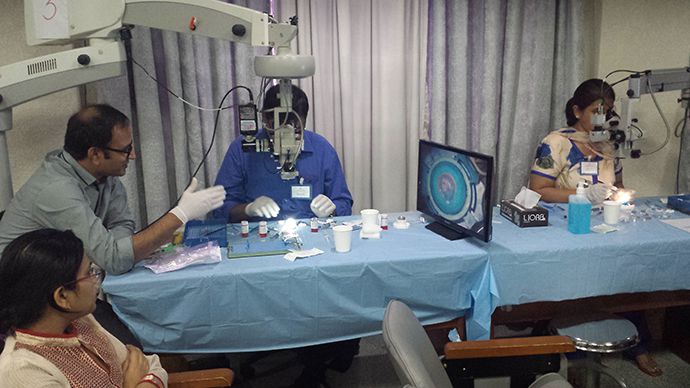 Millions of people throughout the world suffer from corneal blindness — the loss of sight caused by damage to the surface of the eye. Those living in developing countries are particularly vulnerable to the devastating effects of blindness. It can rob adults of economic autonomy as job opportunities for the blind in the developing world are often nonexistent. Children who can’t see the blackboard in school often receive little support and drop out. Blind adults and children can become isolated from their communities, and this often leads to feelings of shame and inadequacy.
Millions of people throughout the world suffer from corneal blindness — the loss of sight caused by damage to the surface of the eye. Those living in developing countries are particularly vulnerable to the devastating effects of blindness. It can rob adults of economic autonomy as job opportunities for the blind in the developing world are often nonexistent. Children who can’t see the blackboard in school often receive little support and drop out. Blind adults and children can become isolated from their communities, and this often leads to feelings of shame and inadequacy.
Corneal blindness, however, is a treatable condition and a corneal transplant is the solution. But a shortage of corneal tissue is keeping millions of adults and children in the dark. SightLife, which runs the largest eye bank in the world, applies its funds and subject matter expertise to increase the number of corneal transplants in the developing world. SightLife’s focus is to build a sustainable local infrastructure covering policy and advocacy work, increasing the capability of eye banks and corneal surgeons, and exploring innovative technologies to change the landscape of patient follow-up care in India, and greater Asia, through providing funding, grants and consultations.
In the United States, there is no waiting list for corneal tissue as the supply is consistent with demand.
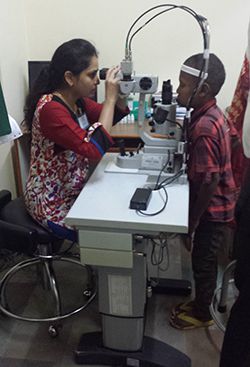 In developing countries, though, a myriad of logistical and social barriers keep corneal patients from having their sight restored. SightLife works to increase the quality of transplants for corneal patients by providing free tissue and free training for corneal surgeons. To help ensure those in need receive high quality transplants, SightLife trains staff at local eye banks so that they can “eye bank better.”
In developing countries, though, a myriad of logistical and social barriers keep corneal patients from having their sight restored. SightLife works to increase the quality of transplants for corneal patients by providing free tissue and free training for corneal surgeons. To help ensure those in need receive high quality transplants, SightLife trains staff at local eye banks so that they can “eye bank better.”
“Eye banks in developing countries are often small, adjunct rooms in state hospitals,” explained Claire Bonilla, SightLife’s Chief Global Officer. One overworked surgeon is in charge of the entire corneal transplant process. This includes finding and collecting corneal tissue, performing the graft and overseeing follow up care. Bonilla and her team push partner eye banks to “think about having an eye bank manager [and] a full staff so that you can start to move higher volumes through specialization…and the surgeon can focus on surgery.” The organization has had great success in India. SightLife’s partner banks have averaged an approximate 30-40% increase in transplants provided per year.
Due to the shortage of corneal tissue, there are still people who are unable to receive corneal grafts even with SightLife helping eye banks increase their production. This is why SightLife has started focusing more on advocacy. “We have to think about the entire ecosystem: advocacy, policy and building up the capabilities of eye banks so that we can get more tissue,” said Bonilla. The organization wants to raise general awareness of corneal blindness, encourage people to become donors and push the government to help regulate donations, creating a favorable environment for eliminating blindness.
Bonilla explained that there are two primary factors that contribute to a lack of corneal tissue in countries such as India — people’s misconceptions about organ donation and a lack of effective government policy to promote the collection of corneal tissue. “Religious beliefs are sometimes a factor and we often have to educate to overcome myths,” said Bonilla. Even if a person wants their eyes to be donated when they die, their wishes aren’t always fulfilled. “If you choose to donate your eyes as a citizen of India or China, there’s no way to record that consent. Whoever recovers your body at the hospital can deny it.”
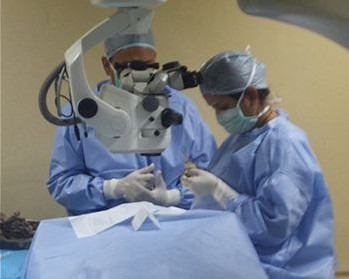 SightLife created the Hospital Cornea Recovery Program (HCRP) to help with the collection of corneal tissue in hospitals. Hospital workers in India frequently fail to notify eye banks of deaths, which leads to numerous missed opportunities for corneal tissue donations. SightLife pays for eye banks to employ eye donation counselors who work in high mortality hospitals. “When there is a death, the eye donation counselor is notified. Then, the eye donation counselor reaches out to the family and talks to them about the benefits of giving sight to another,” explained Bonilla. “Out of a great loss, sight for another can be gained.” Once the counselor gets consent from the family, the deceased’s medical records are reviewed and a recovery technician takes the corneal tissue. Due to the success of programs such as the HCRP, SightLife’s partner eye banks are able to restore sight in more than 1000 men, women and children globally every month.
SightLife created the Hospital Cornea Recovery Program (HCRP) to help with the collection of corneal tissue in hospitals. Hospital workers in India frequently fail to notify eye banks of deaths, which leads to numerous missed opportunities for corneal tissue donations. SightLife pays for eye banks to employ eye donation counselors who work in high mortality hospitals. “When there is a death, the eye donation counselor is notified. Then, the eye donation counselor reaches out to the family and talks to them about the benefits of giving sight to another,” explained Bonilla. “Out of a great loss, sight for another can be gained.” Once the counselor gets consent from the family, the deceased’s medical records are reviewed and a recovery technician takes the corneal tissue. Due to the success of programs such as the HCRP, SightLife’s partner eye banks are able to restore sight in more than 1000 men, women and children globally every month.
SightLife has had great success in India and is now strategizing on how to increase the organization’s presence in China. While their primary mission is advocating to increase the supply of available corneal tissue in countries around the world, they also want to restore every corneal patient’s sight so that the person can once again provide for their families, contribute to society and live up to their full potential. “We help facilitate about 1,000 transplants every month. When I see those numbers, it’s not just the metric of 1,000 transplants,” said Bonilla. “It’s 2,000 hands being enabled. It’s 1,000 homes where we helped changed the dynamic and put more food on the table. And that’s pretty wonderful.”
Back to Top
Changemaker
Chris Jochnick, President & CEO, Landesa
By Kaitlin Marshall
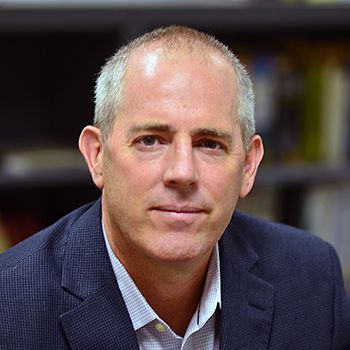 Many of the world’s poorest people, despite relying on agricultural labor to survive, don’t own their own land. A lack of formal government regulation of land ownership in developing countries can leave people vulnerable to losing their land to conflict, foreign corporations or any one of various other entities. And their vulnerability means they have less incentive and opportunity to invest in their land to improve their harvests and their lives.
Many of the world’s poorest people, despite relying on agricultural labor to survive, don’t own their own land. A lack of formal government regulation of land ownership in developing countries can leave people vulnerable to losing their land to conflict, foreign corporations or any one of various other entities. And their vulnerability means they have less incentive and opportunity to invest in their land to improve their harvests and their lives.
For more than four decades, Global Washington member Landesa has worked with governments and other organizations to create pro-poor laws, policies and programs that strengthen land rights of women and men, families and communities across the globe. To date, Landesa has helped more than 100 million families obtain ownership of land or secure rights to their property.
Chris Jochnick recently joined Landesa as the organization’s CEO, bringing with him a wealth of experience working on social and economic rights – including land rights. A Harvard Law School graduate, Jochnick practiced human rights law for ten years and then worked as a corporate attorney on Wall Street before transitioning into global development. Prior to joining Landesa, Jochnick was with Oxfam America for ten years, as the director of Oxfam’s private sector department.
Landesa describes land as a foundation that allows other development efforts to gain traction. Jochnick firmly believes in this philosophy. “Today, the majority of people living in poverty depend on land,” said Jochnick. “[However], most of them don’t have formal claims to that land. Working in a way that moves the needle on securing land rights for those people who are often the most marginalized is a tangible way of making progress on a whole range of development outcomes.”
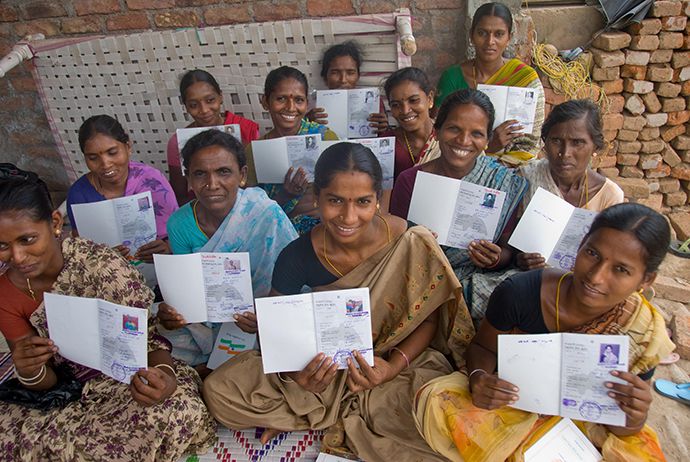
Throughout his career, both in law and the non-profit sector, Jochnick has worked with the development, human rights and environmental communities. Until recently, according to Jochnick, none of these communities gave the issue of land rights sufficient attention. “Land is one of those overlooked issues. Land rights can act as a gateway right that give women and men access to other rights.” said Jochnick. “This is something Landesa has long recognized, and others are now coming to appreciate.”
Jochnick is thrilled to be taking over as CEO of Landesa at a time when more people are recognizing the significance of land rights within the global development sector. “There are so many opportunities now for groups working on land to expand their work,” said the new leader. Landesa is poised to leverage the rising attention to land rights to form new and deeper partnerships with governments, civil society organizations and companies. “[Land rights] is a field that is ripe for new attention, and Landesa offers a perfect platform for that,” said Jochnick. His extensive experience developing partnerships with the private sector will help Landesa move forward in finding new avenues to protect land rights.
At Oxfam, Jochnick initiated a variety of partnerships with Fortune 500 companies and organized collaborative advocacy initiatives. These included the “Behind the Brands” campaign which put pressure on the world’s largest food and beverage companies to ensure they were not displacing families and communities throughout their supply chains. Many countries have no or weak land-related legal infrastructure to regulate land ownership. For example, 90 percent of the land in sub-Saharan Africa is undocumented. Foreign companies who obtain a permit from the government have no way of knowing if the land they are using belongs to someone else, and may unwittingly destroy someone’s source of livelihood. Prior to the Behind the Brands campaign, many companies failed to recognize land as an issue. Corporations increasingly recognize that ensuring they are not displacing communities is a necessary good business practice.
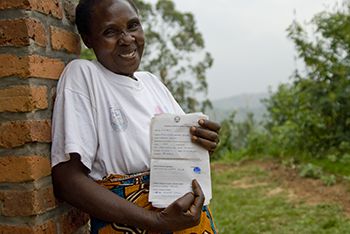 While Landesa has traditionally focused on working to create impact at scale by partnering with foreign governments, it has since expanded to pursue partnerships in the private sector. Companies “are aware of the fact that [land] conflicts are likely to plague them as they move into these countries and want to get ahead of that,” explained Jochnick. “I’ve worked with them in the past to move companies to recognize that there is an issue there, that there is a problem that threatens their bottom line, and then move them to make commitments to land rights.” Landesa’s expertise is valuable to companies that need assistance figuring out how to interact with foreign governments and communities. “There’s a real opportunity to work with some of those companies both in terms of their own businesses and in trying to push for greater formalization of land rights and recognitions of the land rights of traditional holders,” said Jochnick.
While Landesa has traditionally focused on working to create impact at scale by partnering with foreign governments, it has since expanded to pursue partnerships in the private sector. Companies “are aware of the fact that [land] conflicts are likely to plague them as they move into these countries and want to get ahead of that,” explained Jochnick. “I’ve worked with them in the past to move companies to recognize that there is an issue there, that there is a problem that threatens their bottom line, and then move them to make commitments to land rights.” Landesa’s expertise is valuable to companies that need assistance figuring out how to interact with foreign governments and communities. “There’s a real opportunity to work with some of those companies both in terms of their own businesses and in trying to push for greater formalization of land rights and recognitions of the land rights of traditional holders,” said Jochnick.
When asked about his goals for Landesa, Jochnick explained he hopes to expand the organization’s global reach beyond the current focus on India, Africa and China. Jochnick and his team are ready to capitalize on the momentum in the development community and bring together those who have acknowledged the need for a commitment to protecting land rights. “Moving these commitments from principals and standards into actual practice requires a unified and global push, and Landesa wants to be part of that effort,” said Jochnick. By pursuing networks between NGOs, companies, governments and communities, Jochnick is readying Landesa to be a catalyst for global work on land rights and an international leader in the development community.
Back to Top
Welcome New Members
Please welcome our newest Global Washington members. Take a moment to familiarize yourself with their work and consider opportunities for support and collaboration!
3rd Creek Investments, Inc.
3rd Creek is a consortium of organizations dedicated to providing exceptional service, accountability and social responsibility. They provide investment advisory services, accounting assistance, venture capital funding, philanthropic grants and consulting services. Whether it is managing private investment portfolios or funding charitable projects worldwide, 3rd Creek believes in creating positive outcomes and sustaining them over the long run. www.3rdcreek.com
International Leadership Academy of Ethiopia
The International Leadership Academy of Ethiopia (ILAE) is a college preparatory day school located in the Lafto/Lebu area of Addis Ababa for 400 students in grades 9-12. ILAE opened its doors in September 2013 with an inaugural class of 24 highly-capable, underserved ninth grade students, and will add an additional ninth grade class each successive year. http://ilacademy.org/
NetHope
NetHope enables humanitarian organizations to better serve the developing world through smarter use of technology. They help member organizations collaborate, innovate and leverage the full potential of information and communications technology to support their causes. NetHope focuses on five key areas: connectivity, field capacity building, emergency response, shared services and innovation for development. www.nethope.org
Volunteers for Sustainable Development USA
Volunteers for Sustainable Development USA fundraises to support underprivileged children and AIDS orphans in Uganda
Back to Top
Member Events
September 23: World Trade Center Seattle // Women in Business
September 23: Washington State University // International Career Fair
September 26: MED25 // Fall Fundraiser
October 3: EarthCorps // REVIVE Annual Fundraiser
October 9-11: University of Washington // Human Right to Family Planning Conference
October 10: Mona Foundation // 16th Annual Celebration Dinner
October 24: NPH USA // Gala Dinner and Auction
Back to Top
Career Center
Highlighted Positions
Program Director – Literacy Bridge
OpenLMIS Community Manager – VillageReach
Technology Director & Group Lead – VillageReach
For more jobs and resources, visit https://globalwa.org/resources/careers-in-development/
Back to Top
GlobalWA Events
September 16: New Member Orientation
September 17: Learn More: Microsoft Giving Campaign
September 17: ED Roundtable
December 10: GlobalWA 7th Annual Conference
Back to Top


 Today, over 1.8 billion adults in developing countries still lack proof of identity. Without official ID, this population is unable to access essential services such as healthcare and social welfare benefits and exercise fundamental human rights like the right to vote and the right to education.
Today, over 1.8 billion adults in developing countries still lack proof of identity. Without official ID, this population is unable to access essential services such as healthcare and social welfare benefits and exercise fundamental human rights like the right to vote and the right to education. And we are. According to the United Nations, the proportion of people who are undernourished in developing countries has fallen by almost half since 1990. Increasingly, people have more income to buy food and fuel local economies. Small-holder farmers are being recognized as central to the solutions. But there are still 795 million people worldwide who go to bed hungry.
And we are. According to the United Nations, the proportion of people who are undernourished in developing countries has fallen by almost half since 1990. Increasingly, people have more income to buy food and fuel local economies. Small-holder farmers are being recognized as central to the solutions. But there are still 795 million people worldwide who go to bed hungry.


 Adara Development partners with communities in remote areas of Nepal and Uganda to improve people’s lives through health and education. Adara has been in Nepal since 1998, working in the isolated district of Humla throughout that entire period. Nestled in the Himalayas in the northwestern part of the country, Humla is plagued by poverty and can only be reached by small aircraft or by hiking. “We’ve been working there since the very beginning,” said Debbie Lester, Adara’s Clinical Programs and U.S. Country Director. “We do a lot of basic health, sanitation and hygiene programs in Humla. It really started right at the bare basics.”
Adara Development partners with communities in remote areas of Nepal and Uganda to improve people’s lives through health and education. Adara has been in Nepal since 1998, working in the isolated district of Humla throughout that entire period. Nestled in the Himalayas in the northwestern part of the country, Humla is plagued by poverty and can only be reached by small aircraft or by hiking. “We’ve been working there since the very beginning,” said Debbie Lester, Adara’s Clinical Programs and U.S. Country Director. “We do a lot of basic health, sanitation and hygiene programs in Humla. It really started right at the bare basics.” Adara works with farmers in each target village and provides them with the necessary materials and technical assistance to build a greenhouse, as well as the technical training. “We provide materials like the plastic sheets, garden pipes and watering cans, and then the seeds to grow in the greenhouse” said Lester. While Adara continuously improves the design of their greenhouse technologies to meet community needs, there are a number of materials that the farmers provide for themselves. “We always believe in partnering,” said Lester. “The farmers bring their labor and also core materials that are available to them. We insist that farmers construct the greenhouses themselves in partnership with Adara.”
Adara works with farmers in each target village and provides them with the necessary materials and technical assistance to build a greenhouse, as well as the technical training. “We provide materials like the plastic sheets, garden pipes and watering cans, and then the seeds to grow in the greenhouse” said Lester. While Adara continuously improves the design of their greenhouse technologies to meet community needs, there are a number of materials that the farmers provide for themselves. “We always believe in partnering,” said Lester. “The farmers bring their labor and also core materials that are available to them. We insist that farmers construct the greenhouses themselves in partnership with Adara.” In addition to teaching the farmers how to construct and care for their greenhouses, Adara is supporting the Humli people with tree plantation and fruit orchard development. The organization also provides key technologies that allow the farmers to harvest the most from their greenhouses and orchards. Solar dryers, for example, allow farmers to “dry out their food for the cold winter months…it’s easier and more hygienic to dry vegetables and fruits without losing nutrients [this way].” Having nutrient-rich food to last through the winter has resulted in lower levels of malnutrition in children in the villages where Adara has a presence.
In addition to teaching the farmers how to construct and care for their greenhouses, Adara is supporting the Humli people with tree plantation and fruit orchard development. The organization also provides key technologies that allow the farmers to harvest the most from their greenhouses and orchards. Solar dryers, for example, allow farmers to “dry out their food for the cold winter months…it’s easier and more hygienic to dry vegetables and fruits without losing nutrients [this way].” Having nutrient-rich food to last through the winter has resulted in lower levels of malnutrition in children in the villages where Adara has a presence. There are approximately 795 million people worldwide who are undernourished due to lack of a secure food supply. A lack of sufficient quantities of food available on a consistent basis, an absence of resources to maintain a nutritious diet, and unsanitary living conditions are all causes of food insecurity.
There are approximately 795 million people worldwide who are undernourished due to lack of a secure food supply. A lack of sufficient quantities of food available on a consistent basis, an absence of resources to maintain a nutritious diet, and unsanitary living conditions are all causes of food insecurity.  Many people in global health talk about how Coca-Cola supply chain practices could be applied and adapted to health commodities to ensure that vaccines, malaria treatment, family planning commodities, and many more essential medicines are available at the last mile health facilities. And they have a point—I have seen Coca-Cola in pretty much every village I’ve been to in Africa throughout my almost 20 years of going to these remote places.
Many people in global health talk about how Coca-Cola supply chain practices could be applied and adapted to health commodities to ensure that vaccines, malaria treatment, family planning commodities, and many more essential medicines are available at the last mile health facilities. And they have a point—I have seen Coca-Cola in pretty much every village I’ve been to in Africa throughout my almost 20 years of going to these remote places.

 When India became independent in 1947, Jawaharlal Nehru, the country’s first Prime Minister, stressed the importance of ending poverty, ignorance, disease and inequality. In recent years, India has enjoyed consistently high rates of growth and steady improvement in human development. But a critical challenge remains for the world’s largest democracy. Despite growth and steady development, persistent poverty and inequality remain.
When India became independent in 1947, Jawaharlal Nehru, the country’s first Prime Minister, stressed the importance of ending poverty, ignorance, disease and inequality. In recent years, India has enjoyed consistently high rates of growth and steady improvement in human development. But a critical challenge remains for the world’s largest democracy. Despite growth and steady development, persistent poverty and inequality remain. Millions of people throughout the world suffer from corneal blindness — the loss of sight caused by damage to the surface of the eye. Those living in developing countries are particularly vulnerable to the devastating effects of blindness. It can rob adults of economic autonomy as job opportunities for the blind in the developing world are often nonexistent. Children who can’t see the blackboard in school often receive little support and drop out. Blind adults and children can become isolated from their communities, and this often leads to feelings of shame and inadequacy.
Millions of people throughout the world suffer from corneal blindness — the loss of sight caused by damage to the surface of the eye. Those living in developing countries are particularly vulnerable to the devastating effects of blindness. It can rob adults of economic autonomy as job opportunities for the blind in the developing world are often nonexistent. Children who can’t see the blackboard in school often receive little support and drop out. Blind adults and children can become isolated from their communities, and this often leads to feelings of shame and inadequacy. In developing countries, though, a myriad of logistical and social barriers keep corneal patients from having their sight restored. SightLife works to increase the quality of transplants for corneal patients by providing free tissue and free training for corneal surgeons. To help ensure those in need receive high quality transplants, SightLife trains staff at local eye banks so that they can “eye bank better.”
In developing countries, though, a myriad of logistical and social barriers keep corneal patients from having their sight restored. SightLife works to increase the quality of transplants for corneal patients by providing free tissue and free training for corneal surgeons. To help ensure those in need receive high quality transplants, SightLife trains staff at local eye banks so that they can “eye bank better.” SightLife created the Hospital Cornea Recovery Program (HCRP) to help with the collection of corneal tissue in hospitals. Hospital workers in India frequently fail to notify eye banks of deaths, which leads to numerous missed opportunities for corneal tissue donations. SightLife pays for eye banks to employ eye donation counselors who work in high mortality hospitals. “When there is a death, the eye donation counselor is notified. Then, the eye donation counselor reaches out to the family and talks to them about the benefits of giving sight to another,” explained Bonilla. “Out of a great loss, sight for another can be gained.” Once the counselor gets consent from the family, the deceased’s medical records are reviewed and a recovery technician takes the corneal tissue. Due to the success of programs such as the HCRP, SightLife’s partner eye banks are able to restore sight in more than 1000 men, women and children globally every month.
SightLife created the Hospital Cornea Recovery Program (HCRP) to help with the collection of corneal tissue in hospitals. Hospital workers in India frequently fail to notify eye banks of deaths, which leads to numerous missed opportunities for corneal tissue donations. SightLife pays for eye banks to employ eye donation counselors who work in high mortality hospitals. “When there is a death, the eye donation counselor is notified. Then, the eye donation counselor reaches out to the family and talks to them about the benefits of giving sight to another,” explained Bonilla. “Out of a great loss, sight for another can be gained.” Once the counselor gets consent from the family, the deceased’s medical records are reviewed and a recovery technician takes the corneal tissue. Due to the success of programs such as the HCRP, SightLife’s partner eye banks are able to restore sight in more than 1000 men, women and children globally every month. Many of the world’s poorest people, despite relying on agricultural labor to survive, don’t own their own land. A lack of formal government regulation of land ownership in developing countries can leave people vulnerable to losing their land to conflict, foreign corporations or any one of various other entities. And their vulnerability means they have less incentive and opportunity to invest in their land to improve their harvests and their lives.
Many of the world’s poorest people, despite relying on agricultural labor to survive, don’t own their own land. A lack of formal government regulation of land ownership in developing countries can leave people vulnerable to losing their land to conflict, foreign corporations or any one of various other entities. And their vulnerability means they have less incentive and opportunity to invest in their land to improve their harvests and their lives.
 While Landesa has traditionally focused on working to create impact at scale by partnering with foreign governments, it has since expanded to pursue partnerships in the private sector. Companies “are aware of the fact that [land] conflicts are likely to plague them as they move into these countries and want to get ahead of that,” explained Jochnick. “I’ve worked with them in the past to move companies to recognize that there is an issue there, that there is a problem that threatens their bottom line, and then move them to make commitments to land rights.” Landesa’s expertise is valuable to companies that need assistance figuring out how to interact with foreign governments and communities. “There’s a real opportunity to work with some of those companies both in terms of their own businesses and in trying to push for greater formalization of land rights and recognitions of the land rights of traditional holders,” said Jochnick.
While Landesa has traditionally focused on working to create impact at scale by partnering with foreign governments, it has since expanded to pursue partnerships in the private sector. Companies “are aware of the fact that [land] conflicts are likely to plague them as they move into these countries and want to get ahead of that,” explained Jochnick. “I’ve worked with them in the past to move companies to recognize that there is an issue there, that there is a problem that threatens their bottom line, and then move them to make commitments to land rights.” Landesa’s expertise is valuable to companies that need assistance figuring out how to interact with foreign governments and communities. “There’s a real opportunity to work with some of those companies both in terms of their own businesses and in trying to push for greater formalization of land rights and recognitions of the land rights of traditional holders,” said Jochnick.